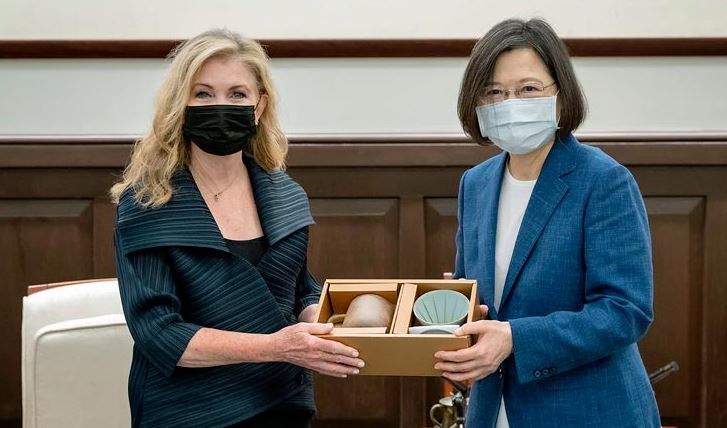On Friday, United States Senator Marsha Blackburn travelled to Taiwan for a meeting with Taiwan’s President Tsai Ing-wen. This was the second visit by members of Congress to Taiwan since House Speaker Nancy Pelosi’s trip earlier this month, which significantly heightened tensions with China.
Tsai indicated in her remarks that the large-scale military exercises that China launched in response to Pelosi’s visit, as well as Russia’s invasion of Ukraine, both pose challenges to democratic governments such as the United States and Taiwan. Tsai was referring to the fact that Pelosi had visited China.
Tennessee Republican Marsha Blackburn underlined the common principles between the two countries and said that she “looking forward to continuing to support Taiwan as they strive ahead as an independent country.” Blackburn is from the state of Tennessee.
High-level foreign trips to Taiwan are seen as meddling in China’s internal affairs and a de facto acceptance of Taiwanese sovereignty in the eyes of China, which claims self-ruled Taiwan as its own territory and has said that it would seize Taiwan by force if necessary. Recent Chinese military exercises have been seen by some as a dress rehearsal for an impending military operation against the island. According to US military commanders, such an operation might take place within the next few years.
During their discussion, Tsai and Blackburn emphasised the significance of economic ties, particularly in the semiconductor industry, where Taiwan is a global leader and the United States is looking to increase domestic investment.
According to a statement released by her office, Blackburn landed in Taipei late on Thursday night after travelling to Fiji, the Solomon Islands, and Papua New Guinea as part of an effort by the United States to “grow our diplomatic presence in the region.”
Blackburn, a stalwart admirer of the previous President Donald Trump, was cited as claiming that “the Indo-Pacific area is the next battlefield for the new axis of evil.” It is imperative that we take a stance against the Chinese Communist Party.
The United States of America and its allies, such as Australia, view China’s recent actions in the western Pacific as an attempt to subvert the traditional security order in the region. China has been expanding its influence in the region by signing a broad security agreement with the Solomon Islands.
Pelosi was the highest-ranking member of the United States government to go to Taiwan in the last quarter of a century. As a response, China announced that it will conduct military drills in six different zones surrounding the island. These drills will include firing missiles over the island and sending ships across the middle of the Taiwan Strait. These manoeuvres are intended to serve as a buffer between China and Taiwan. Some of the missiles crashed within the exclusive economic zone that Japan has.
After Pelosi’s visit, a group of representatives and senators from both chambers of Congress went there. This past week, the governor of Indiana paid a visit with the purpose of fostering economic and academic partnerships. Politicians from the United States have referred to their trips there as a demonstration of support for the island.
This week, Taiwan was also pleased to receive prominent politicians from Japan.
Joseph Wu, the island’s Minister of Foreign Affairs, said on Friday that he welcomed any and all visits by government representatives from other countries.
Blackburn is scheduled to meet with the chairman of Taiwan’s National Security Council throughout the course of her tour, which will last for three days.
In deference to China, the United States maintains no official diplomatic ties with Taiwan; however, it continues to be the island’s most important security guarantor. United States law mandates that the United States ensure Taiwan possesses the means to defend itself and that it views threats to the island as matters of “grave concern.”
Taiwan and China severed their ties in 1949 after the conclusion of a civil war. Although they do not have formal connections, the two countries remain economically intertwined due to the presence of billions of dollars in commerce and investment.
Since Taiwan chose Tsai as its president, China has ramped up the amount of pressure it is applying to Taiwan. Tsai is pro-independence. The Chinese government severed all ties with the Taiwanese government after Tsai’s refusal to support the idea of a unified China as a single country.
On Thursday, the executive arm of Taiwan’s government presented proposals for an increase of 12.9 percent in the yearly budget of the Defense Ministry for the year that will begin on January 1, 2019. The budget for the year calls for a total expenditure of 415.1 billion New Taiwan dollars ($13.8 billion), of which the government plans to spend an extra 47.5 billion New Taiwan dollars ($1.6 billion).
Additionally on Thursday, the Defense Ministry said that it has detected four Chinese navy ships and 15 Chinese aeroplanes in the area around the island.

